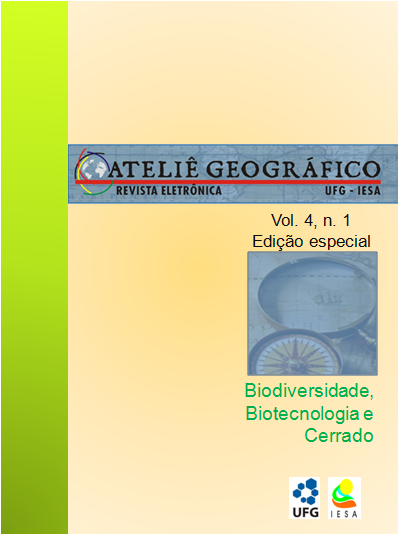Cerrado e território: conflitos socioespaciais na apropriação da Biodiversidade – os povos indígenas Karajás, Aruanã-Go - DOI 10.5216/ag.v4i1.16683
DOI:
https://doi.org/10.5216/ag.v4i1.16683Resumo
A inserção desigual das áreas de Cerrado no jogo da economia nacional e internacional tem alterado o gradiente natural de seus ambientes e os modos de vida de seus povos. Essas mudanças intercedem nos territórios indígenas, criando um cenário de disputa territorial que atinge a vida dos Povos Karajá, de Aruanã-Go - objeto do presente artigo. Cabe então perguntar: como os povos Karajá desenvolvem a apropriação da biodiversidade do Cerrado imerso nesses conflitos? A pesquisa realizada contou com vários dispositivos e procedimentos teórico-metodológicos, e, mais precisamente, apoiou-se no que se tem denominado Abordagem Territorial. A ação qualitativa utilizada na realização do trabalho intentou aglutinar os componentes socioeconômicos aos socioculturais e simbólicos, de maneira a captar a força imperativa da economia capitalista e a ação resistente da cultura Karajá nos interstícios dessa economia, logrando, como resultado, isso: os povos Karajá internalizam em suas relações com o lugar e consigo mesmos, os conflitos externos em forma de mudança de hábitos alimentares, lazer, trabalho, moradia etc. Mas agem para criar alternativas que, dentro do conflito, vislumbrem a sobrevida de suas tradições e de seus afetos.
Downloads
Downloads
Publicado
Como Citar
Edição
Seção
Licença
Autores que publicam nesta revista concordam com os seguintes termos:- Autores mantém os direitos autorais e concedem à revista o direito de primeira publicação, com o trabalho simultaneamente licenciado sob a Licença Creative Commons Attribution que permite o compartilhamento do trabalho com reconhecimento da autoria e publicação inicial nesta revista.
- Os autores não serão remunerados pela publicação de trabalhos na Revista Ateliê Geográfico. Além disso, os conteúdos publicados são de inteira e exclusiva responsabilidade de seus autores, ainda que reservado aos editores o direito de proceder a ajustes textuais e de adequação às normas da publicação.
- Autores têm permissão e são estimulados a divulgar seu trabalho online (ex.: em repositórios institucionais ou na sua página pessoal), já que isso pode gerar alterações produtivas, bem como aumentar o impacto e a citação do trabalho publicado (Veja O Efeito do Acesso Livre).


